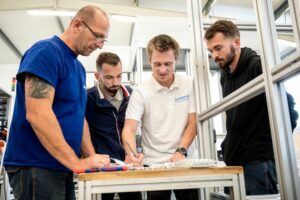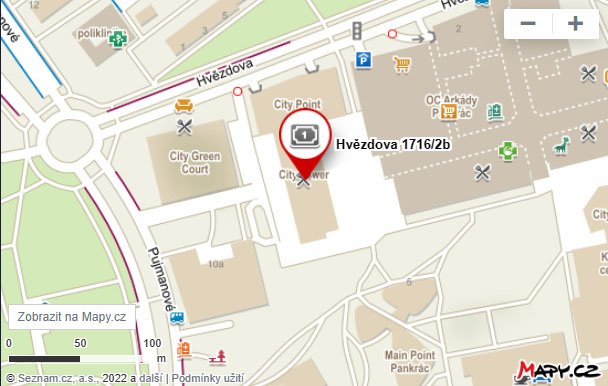In addition, manufacturing companies have had to respond to a chronic shortage of workers in both production and support processes. Add to this the need to invest in sustainable energy sources and the increasing pressure to decarbonize many manufacturing sectors, and you get a fairly stark picture of the market in which Central European Automation Holding (CEAH) has long been operating across Central Europe.
Despite their downward trend, energy prices are still significantly higher than before the start of the war in Ukraine, which has forced many companies to seek immediate cost-saving and transformational measures.
To make matters worse, the European industrial region is fighting for its future place in the global market with the US and Southeast Asia. These regions benefit, in particular, from more favorable energy prices, lower labor costs (Asia), and national support programs for manufacturing firms (USA).
The end of the year is approaching, and we can already define exactly how manufacturing companies are trying to cope with the above challenges, what technology plays in this effort, and what role Central European Automation Holding plays as a leader in industrial automation in Central Europe.

Uncertainty is the only certainty
Let’s look at a select few on the numbers. A survey by the Confederation of Industry of the Czech Republic at the beginning of 2023 indicates that 74 % of respondents plan to respond to the current market situation by reducing operating costs. 59 % said they would invest in energy savings. 34 % of respondents to the same survey said they plan to invest in increasing productivity by implementing elements of digitalization, for example, by using Industry 4.0 technologies.
The above mentioned activities show that manufacturing companies need to increase their efforts to build resilience significantly. Resilience can be understood differently, and the approach has many layers. In particular, flexible and transparent manufacturing, enabled primarily by industrial automation and data-driven operations, is vital for us.
At CEAH, we have built competencies that help our customers build a resilient business. In particular, automated assembly lines, robotic workstations, interconnected enterprise IT systems, and production machinery and equipment are crucial areas that help manufacturing companies build a modern environment.
Modern assembly lines can be equipped with data acquisition technologies. These can be sensors, including RFID technology, the control systems themselves, or IT devices that collect data on every single step of the production process in the assembly line. This data can include production speed, energy consumption, temperatures, pressures, cycle times, number of defective parts, and many other parameters. Data collection must be done in real-time so that the operator or the line can react immediately to a situation on the production line. It is the complete data connection between operational technologies and business information systems that is the trend that will accelerate in 2023. Mainly thanks to companies‘ investments in digital transformation. Not only „smart“ control systems or sensors but also the building of data warehouses, using cloud platforms, and edge computing play a crucial role in data acquisition.
However, with the increasing volume of technologies connected to networks, the risk of cyber-attacks on the company’s infrastructure and production technologies is growing significantly. We often hear that a manufacturing company’s IT infrastructure is well-secured regarding cyber threats. However, companies rate manufacturing technology as a relatively weak point, where dangers caused directly by a sophisticated hacker attack through network connections or, conversely, quite trivially, are underestimated in the manufacturing environment. For example, by uploading malicious code from a USB device. Cyber security must, therefore, be high on the priority list of every employee, not just the corporate IT department.
Recall that the technology and personnel developing, operating, and servicing it are vital to building resilience. Building personnel competencies is essential for any manufacturing company’s long-term sustainable development of digitalization and automation, both in the technology development departments and among the technology operators directly in the operating environment. Investments in staff development, especially in their digital skills related to modern technologies, typically have a very short payback period associated with higher productivity, less waste, and a higher use rate of existing technologies. Therefore, workforce development must be an integral part of any transformation at all levels and, in principle, in all areas covered by the company.

The rise of digital brains
If we had to pick a single topic that permeated the entire year 2023, it would certainly be the use of artificial intelligence (AI). Interest in AI has been accelerated by the meteoric rise of ChatGPT technology from OpenAI. The global phenomenon and its followers have also found their way into manufacturing companies. Soon after its launch, several companies began testing the use of so-called large language models, better known by the English acronym LLM (large language models), in several areas. One global manufacturing company was even able to identify more than 50 possible areas of use for LLM technology across most processes, from sales and marketing to human resource management and production planning.
Early adopters, referred to in English as „early adopters,“ have to deal with several technological challenges, in particular, related to so-called hallucinations, which are inaccurate or even wholly false answers. Another factor to consider if you are serious about using LLM technology is the risks associated with the leakage of your data. However, these are not intractable challenges. Several global manufacturing companies are already working with technology companies and system integrators to roll out private LLM environments where clearly defined data is available, which is also protected from potential sharing outside the specified environment.
ChatGPT is undoubtedly the technological phenomenon of 2023. However, the technologies using artificial intelligence based on machine learning and neural networks are already established. At CEAH, we are particularly interested in artificial intelligence solutions in predictive maintenance, intralogistics solutions, or engineering. Therefore, we have experienced in practice that seemingly attractive plug-and-play solutions usually fail to work, and systems need to be set up in actual customer conditions. Again, we come back to data, the availability of which is a crucial application of AI.
Although theoretically, AI solutions can be applied to dozens of industrial applications, only a few areas make sense in terms of practical benefits:
Predictive maintenance: AI can predict potential failures and problems in production equipment by analyzing data from assembly lines. This allows preventive care to be carried out, reducing the risk of unplanned production downtime and extending machine life.
Manufacturing process optimization: artificial intelligence can analyze data and identify optimal settings and procedures in the manufacturing process. This leads to higher productivity, lower costs, optimal energy consumption, and improved product quality.
Autonomous quality control: assembly line data allows real-time monitoring and quality control. Artificial intelligence can quickly react to deviations and errors in the production process, minimizing defective parts and reducing losses.
Flexible production control: artificial intelligence allows the production process to change and adapt quickly to evolving requirements and market conditions.
Technologies that use elements of artificial intelligence also have one critical application, which has been growing in importance, especially in recent years: They help to, directly and indirectly, address the ever-increasing challenges associated with the shortage of experienced workers in many positions. In particular, jobs that require years of experience, such as machine maintenance, customer support, or quality control. This is where the so-called AI copilots or whisperers find their application. These are digital assistants who stand in for a more experienced colleague. Therefore, they can advise a service worker, for example, on selecting the correct spare part for a customer, automating the creation of code for programming production technologies, or communicating with a production line operator regarding setting production parameters.
So far, we are only seeing the tip of the iceberg of what AI tools can do in practice. And 2024 will accelerate the integration of AI and industrial automation.

Towards sustainability & decarbonisation
Suppose 2023 was the year of the acceleration of automation and artificial intelligence. In that case, it is safe to say that for many manufacturing companies and their executives, it was the year of awakening to a sustainable reality. The deadline for the start of the European Corporate Sustainability Reporting Directive (CSRD) is fast approaching, requiring companies to disclose data on their environmental, employee, and company-wide sustainability performance from 1 January 2024 and 1 January 2025, respectively.
Recall that the CSRD report includes, among other things, carbon footprint reporting. But be warned, sustainability is not only required by regulatory requirements from the European Union. Indeed, we could go further by the needs of users, customers, investors, or financial institutions. In short, there is and will be no escape from the implementation, especially the active management of sustainable principles. Manufacturing companies must, therefore, adapt to this new situation for many. Preferably, it is through an approach where the principles of sustainability, circular economy, and carbon neutrality are embedded in all aspects of the company’s operations, forming one of the fundamental pillars of the corporate culture.
In short, sustainability is a philosophy that delivers value to owners and shareholders, employees, suppliers, business partners, local communities, and society.
Therefore, consider sustainability so it is not a barrier to daily operations. Or even that it does not become just a necessary cost that otherwise does not bring additional value to the company. It is, therefore, essential to define the available data, the methodology for collecting it, and clear and measurable objectives. A global study by an unnamed consultancy firm predicts that by 2026, 60% of manufacturing companies in the Global 2000 index will use sustainability indicators as relevant management parameters for their manufacturing operations. This compares to just 20% of companies in 2021.
At CEAH, we increasingly encounter customer requests to develop and produce technologies that contribute to sustainability goals through their operation. Primarily, this concerns the energy intensity of production lines, which has implications for the overall cost of operating the bar and the carbon footprint size.
Onward to 2024…and beyond!
As mentioned in the introduction, 2023 brought society several challenges and technological innovations. The development of automation, robotics, and AI-based technologies has made it possible to increase the resilience of companies to unforeseen influences that we often have no idea will occur. However, this development must go hand in hand with the development of staff across departments or roles, as technology alone still needs to be fully capable of evolving independently, adapting to change, or creating new products and services. Innovation and the ability to leapfrog processes and products will be crucial parameters in the success or failure of any individual company. Equally important will be the ability to meet the requirements of authorities and regulators, especially in CSRD reporting. The pursuit of carbon neutrality is now a standard goal of many manufacturing companies globally and in the Czech Republic. But this does not mean that there is nothing further to improve. On the contrary!
Whatever the uncertainties of 2024, companies that can combine technology development, product innovation, workforce development, and sustainability goals while managing their profitability will be well prepared.
Because uncertainty is the only certainty!
Central European Automation Holding a.s. provides complete solutions for industrial automation, digitalization of production, and intralogistics. It builds on the foundations and 30 years of experience of individual companies in the holding, which are established players and have been providing solutions and services for the largest manufacturing companies in Central Europe for several decades.
Central European Automation Holding a.s. is a leading technology and manufacturing company specializing in comprehensive solutions in industrial automation, digitalization of production, and intralogistics, from solution design through implementation to service and maintenance. The company’s key strength is a solid foundation built on 30 years of experience of individual companies within the holding.
With a history as an established supplier of automation solutions and many years in the industry, CEAH has become a key partner for the largest manufacturing companies in Central Europe. Each company in the holding brings unique know-how and expertise that spans a wide range of manufacturing industries, including automotive and electrical.
Central European Automation Holding’s services and solutions are not just about technological innovation but also about creating strategic partnerships that take industrial automation to the next level.

